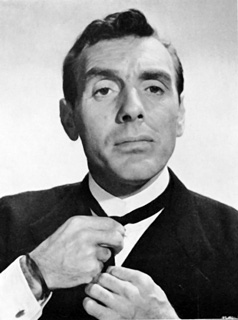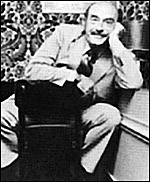Related Research Articles

Eric Sykes was an English radio, stage, television and film writer, comedian, actor and director whose performing career spanned more than 50 years. He frequently wrote for and performed with many other leading comedy performers and writers of the period, including Tony Hancock, Spike Milligan, Tommy Cooper, Peter Sellers, John Antrobus and Johnny Speight. Sykes first came to prominence through his many radio credits as a writer and actor in the 1950s, which include collaboration on some scripts for The Goon Show. He became a TV star in his own right in the early 1960s when he appeared with Hattie Jacques in several popular BBC comedy television series.
My Word! is a British radio quiz panel game broadcast by the BBC on the Home Service (1956–67) and Radio 4 (1967–88). It was created by Edward J. Mason and Tony Shryane, and featured the humorous writers Frank Muir and Denis Norden, known in Britain for the series Take It From Here. The show was piloted in June 1956 on the Midland Home Service and broadcast as a series on the national Home Service network from 1 January 1957. The series also ran on BBC Television for one series from July–September 1960.
My Music was a British radio panel show which premiered on the BBC Home Service on 3 January 1967. It was a companion programme to My Word!, and like that show featured comic writers Denis Norden and Frank Muir. The show was last recorded in November 1993 and broadcast in January 1994, then rebroadcast until 2011. It was also broadcast via the BBC World Service. There was also a television version on BBC2 which ran for seven series between 1977 and 1983.
Take It from Here is a British radio comedy programme broadcast by the BBC between 1948 and 1960. It was written by Frank Muir and Denis Norden, and starred Jimmy Edwards, Dick Bentley and Joy Nichols. When Nichols moved to New York City in 1953, she was replaced by June Whitfield and Alma Cogan. The show is best remembered for introducing The Glums. Through TIFH Muir and Norden reinvented British post-war radio comedy – amongst other influences, it was one of the first shows with a significant segment consisting of parody of film and book styles, later used extensively in programmes such as Round the Horne and in many television comedy series.

Denis Mostyn Norden was an English comedy writer and television presenter. After an early career working in cinemas, he began scriptwriting during the Second World War. From 1948 to 1959, he co-wrote the BBC Radio comedy programme Take It from Here with Frank Muir. Muir and Norden remained associated for more than 50 years, appearing regularly together on the radio panel programmes My Word! and My Music after they stopped collaborating on scripts. He also wrote scripts for Hollywood films. He presented television programmes on ITV for many years, including the nostalgia quiz Looks Familiar and blooper shows It'll be Alright on the Night and Laughter File.

Frank Herbert Muir was an English comedy writer, radio and television personality, and raconteur. His writing and performing partnership with Denis Norden endured for most of their careers. Together they wrote BBC Radio's Take It from Here for over 10 years, and then appeared on BBC radio quizzes My Word! and My Music for another 35. Muir became Assistant Head of Light Entertainment at the BBC in the 1960s, and was then London Weekend Television's founding Head of Entertainment. His many writing credits include editorship of The Oxford Book of Humorous Prose, as well as the What-a-Mess books that were later turned into an animated TV series.

James Keith O'Neill Edwards, DFC was an English comedy writer and actor on radio and television, known for his roles as Pa Glum in Take It from Here and as headmaster "Professor" James Edwards in Whack-O!.

Whack-O! is a British sitcom TV series starring Jimmy Edwards. It was written by Frank Muir and Denis Norden.

Charles Walter "Dick" Bentley was an Australian-born comedian and actor of radio, stage and screen. He starred with Jimmy Edwards in Take It From Here for BBC Radio. He was a staple of and pioneer of radio, having started his career in the medium in the early 1930s. He appeared on screen from the late 1940s until retiring in 1978.

Talbot Nelson Conn "Tolly" Rothwell, OBE was an English screenwriter.
Sid Colin was an English scriptwriter, working for radio, television and the cinema. He is best remembered for creating the television comedy The Army Game (1957–59) and writing for Up Pompeii! (1969–1970), as well as films including Carry On Spying and Percy's Progress. He occasionally collaborated with regular Carry On series writer Talbot Rothwell. Earlier in his career, he was a musician and occasional lyricist.
Faces of Jim was a black-and-white British comedy television series starring Jimmy Edwards, June Whitfield and Ronnie Barker, with each episode being an individual half-hour sitcom. The first series aired as The Seven Faces of Jim, the second as Six More Faces of Jim and the third series as More Faces of Jim. All the episodes were written by Frank Muir and Denis Norden.

Henry Edward Kavanagh was a British radio scriptwriter and producer.
"Balham, Gateway to the South" is a comedy sketch that parodies cinema travelogues by presenting the South London suburb of Balham as an exotic locale. It was written by Frank Muir and Denis Norden for the short-lived BBC radio series Third Division and featured in the second edition broadcast on the BBC Third Programme on 2 February 1949. The sketch's depiction of Balham as a faraway, desirable location contrasted with the real area during postwar austerity. One memorable part of the sketch is the pronunciation of Balham as "Bal-Ham" in an American accent, instead of the British pronunciation "Bal-um".

Peter Geoffrey Francis Jones was an English actor, screenwriter and broadcaster.

Patrick "Pat" Kenneth Macneile Dixon was an English radio producer for BBC Radio.
Brian Tesler is a British television producer and executive. His career encompassed British television's post-war evolution from a single-channel BBC to the beginning of today's multitude of cable and satellite channels. He worked as a producer for Independent Television, as well as the BBC.
This is a list of events from British radio in 1949.
This is a list of events from British radio in 1948.

The Best of Sellers is the first studio album by the English actor, comedian and singer Peter Sellers. Released as a 10-inch LP on EMI's Parlophone label in December 1958, the album has been cited as "the first British comedy LP created in a recording studio". Sellers plays all of the roles, satirising the British class system and rock and roll, and the album represented an artistic breakthrough for producer George Martin. Despite initial concerns about its commercial viability from EMI, The Best of Sellers was a major success, receiving critical acclaim and reaching number three in the UK Albums Chart.
References
- ↑ "Norden, Denis (1922-)". Screenonline. Retrieved 4 August 2012.
- ↑ "And So to Bentley". Genome BETA Radio Times 1923 - 2009. BBC. 29 October 1954. Retrieved 24 February 2018.
- ↑ Lewis, Roger (1995). The Life and Death of Peter Sellers. Arrow. p. 292. ISBN 978-0-09-974700-0 . Retrieved 4 August 2012.
- ↑ "BBC Radio 4 Extra - A Taste of Funny with Denis Norden".